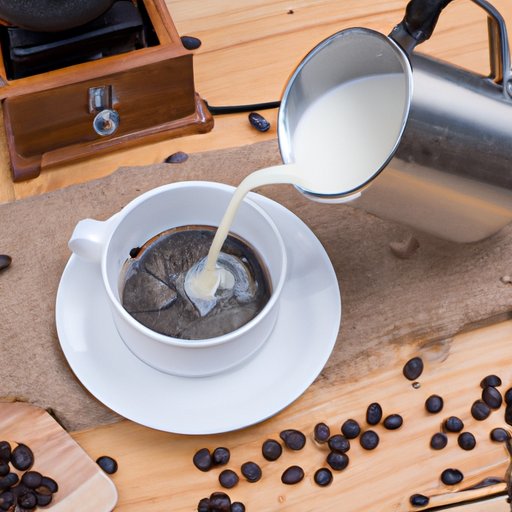
I. Introduction
Do you struggle to make a good cup of coffee in the morning? You’re not alone. It can be challenging to balance the right combination of taste and aroma to make the perfect cup. In this article, we’ll provide tips and guidelines for making great coffee to get your day started on the right foot.
Throughout this article, we’ll explore the key components of coffee making, from choosing the right coffee beans to experimenting with brewing methods, and achieving the perfect balance of milk and sugar. Here’s what you can expect to learn:
II. Start with the Beans
The quality of your coffee beans can make or break your cup of coffee. It’s important to select high-quality coffee beans to ensure a great-tasting cup.
When choosing coffee beans, look for the following characteristics:
- Choose beans that are recently roasted, as they tend to have more flavor and aroma.
- Check the packaging for information on the origin of the beans and how they were grown or processed.
- Choose beans that have a strong, fresh aroma.
There are many different types of coffee beans, including Arabica, Robusta, and blends of the two. Arabica is the most common and popular type of coffee bean, known for its rich and complex flavor. Robusta beans are more bitter and are typically used in espresso blends.
III. Water Temperature and Quality
The water used for brewing coffee can also significantly impact the taste of your coffee. Ideal water temperature for coffee-making is 195-205°F (90-96°C).
Use filtered or bottled water when making coffee to avoid any unwanted flavors or odors. If your tap water has a strong or unpleasant smell, it can ruin the taste of your coffee.
IV. Grinding and Roasting
The way you grind your coffee beans and the roast level can have a great impact on the final taste of the coffee.
For a great tasting cup of coffee, it’s important to grind your coffee beans properly. The best grind will depend on the brewing method you use. For example, for a French Press, you will need a coarse grind, while for pour-over brewing, you will need a medium fine grind.
Roasting determines the taste, aroma, and color of your coffee beans. Different roasting levels will produce different flavor profiles. Light roast coffee has a more delicate and floral flavor, while dark roast coffee has a stronger and bolder flavor. It’s all about finding the roast level that suits your personal taste.
V. Equipment and Tools
In order to make great coffee at home, you’ll also need some basic equipment and tools. These can include:
- Coffee grinder
- Coffee maker (such as a drip coffee maker, French Press, or pour-over coffee maker)
- Digital scale (to measure your coffee and water)
- Coffee mug or cup
There are many different types of coffee makers and grinders on the market, with a range of prices and features. Do your research to find the best options for your budget and personal preferences.
VI. Experiment with Brewing Method
Experimenting with different brewing methods can help you discover new and exciting coffee flavors. Some of the most popular brewing methods include:
- Drip brewing
- French Press brewing
- Pour-over brewing
- Cold brewing
Each brewing method has its own unique characteristics that may appeal to different taste preferences. Experimenting with different brewing methods can help you find the perfect cup of coffee.
VII. Don’t Skimp on Milk and Sugar
The right amount of milk and sugar can add a pleasant sweetness to your coffee, enhancing its flavors. When adding milk or sugar, it’s important to consider the type of milk or sweetener you’re using, and the amount you need to balance the flavors of the coffee.
For example, dairy milk can add a creamy and mildly sweet flavor, while almond milk can add a nutty and slightly sweet flavor. Sugar can also enhance the taste of coffee, but too much sugar can overpower the coffee’s flavors.
VIII. Practice, Practice, Practice
The most important thing you can do to improve your coffee-making skills is to practice regularly. With each cup, you can try new things and experiment with different brewing methods, coffee beans, and milk and sugar combinations.
One tip to keep in mind is to use the same amount of coffee grounds and water for each cup of coffee, so you can consistently achieve the same taste and flavor every time.
IX. Conclusion
Making great coffee requires attention to detail and a willingness to experiment. Starting with high-quality coffee beans, the right water temperature, and proper grinding and roasting techniques can all help to create a great-tasting cup of coffee.
Experiment with different brewing methods, milk and sugar combinations, and equipment and tools to discover your personal favorite coffee blend. Practice regularly to improve your skills and enjoy the perfect cup of coffee every time.




